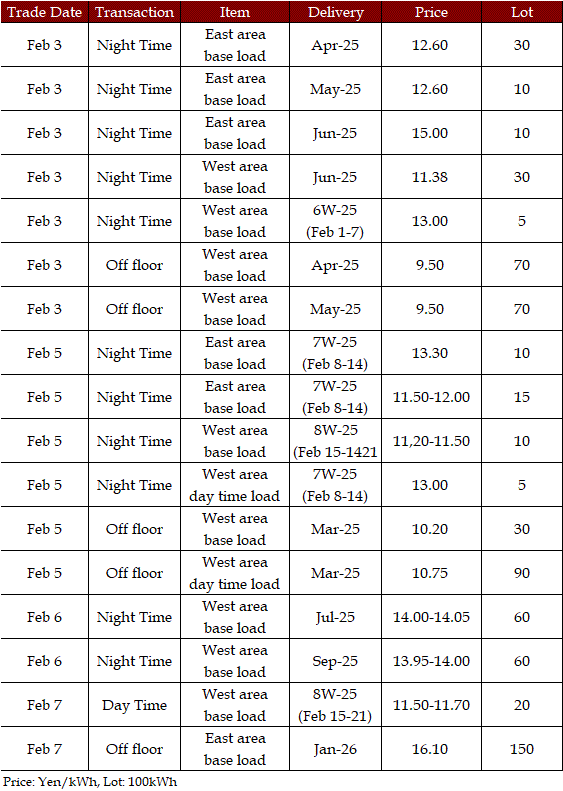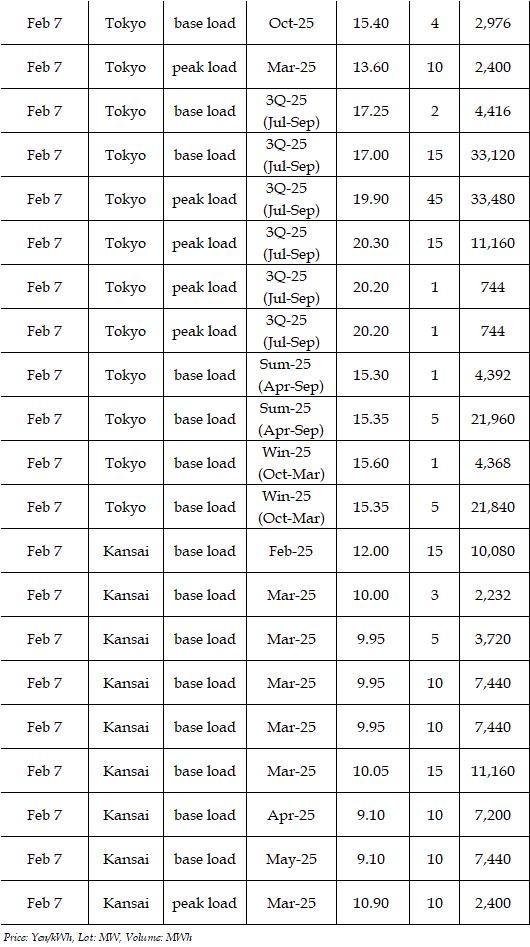|
In the day-ahead market on JEPX (Japan Electric Power Exchange), the 24-hour spot power prices on a weekly average basis for Feb 3-7 delivery gained ground from the previous week in both East Japan (50Hz) and West Japan (60Hz). An arrival of the most powerful cold snap this season brought harsh chilly climate across Japan, and a sharp growth in heating demand accelerated price rises. Especially in West Japan, supply-demand fundamentals remarkably tightened up with snowfall witnessed even in southern Kyushu. Thus, spot prices extended gains steeply, pushing the East-West price gap into a reverse pattern in favor of the West from the middle of the week onward.
In Tokyo and Kansai, the key areas in East Japan and West Japan, the 24-hour average posted a difference in favor of the East by Yen 1.59 for Feb 3 delivery. But Kansai outperformed Tokyo by Yen 0.24 for Feb 4 delivery, Yen 0.34 for Feb 5 delivery, Yen 1.26 for Feb 6 delivery and Yen 1.42 for Feb 7 delivery.
The fuel market trends in the first week of February were detailed as follows.
DES Northeast Asia spot LNG prices hovered in the high $14 level per mmBtu for prompt March 2025 arrival as of Feb 6, up about 30cts from the end of the previous week (Jan 31). A sustained rally in European natural gas prices lifted the LNG market in Northeast Asia. In addition, buybacks by traders also served as a bullish factor for LNG prices. But the market's rise was limited as appetite from Northeast Asian end-users continued to wane. The Ministry of Economy, Trade and Industry (METI) announced on Feb 5 that Japan's LNG inventories for power generation stood at 2.41 mil mt as of Feb 2, up 260,000mt from a week before. The figure was up from 2.18 mil mt that was the end-February level last year and also the average of past five years.
FOB Newcastle thermal coal prices in Australia stood at slightly below $109 per ton for February 2025 loading as of Feb 6. The level was down nearly $10 from the end of the previous week, in response to a drop in crude oil prices.
In the crude oil market, WTI crude for March 2025 stood in the mid $70 level per barrel as of the morning on Feb 7 while Brent crude for April 2025 was trading in the low $74 level. Compared with the end of the previous week, WTI was down nearly $2 while Brent gave up about $1.50. Crude oil prices came under pressure from worries that the tariff war between US and China would deteriorate the economy. The market was also unaided by a buildup in US crude oil inventories, combined with the outlook for growing US crude oil production.
The actual highest price during the week was at Yen 29.00 in five areas in West Japan excluding Shikoku for Feb 7 delivery. Meanwhile, the actual lowest price during the week was at Yen 0.01 in Shikoku for Feb 5 delivery.
By area, the weekly average of the 24-hour spot prices was at Yen 14.42 in Hokkaido, up Yen 0.87 from the previous week, Yen 14.55 in Tohoku, up Yen 1.31, Yen 15.13 in Tokyo, up Yen 1.65, Yen 15.79 in Chubu, up Yen 2.24, Yen 15.47 in Hokuriku, up Yen 2.63, Yen 15.47 in Kansai, up Yen 2.68, Yen 15.47 in Chugoku, up Yen 2.87, Yen 10.20 in Shikoku, down Yen 0.21, and Yen 14.88 in Kyushu, up Yen 2.65.
In the JEPX auction, volumes of offers were 1,187.85 mil kWh on a weekly average basis, down 7.0% from the previous week. Meanwhile, bids on a weekly average basis jumped by 9.1% to 1,141.32 mil kWh. The weekly average of trade volumes increased by 2.3% to 872.97 mil kWh.
Power demand in nine areas of Japan during Feb 3-7 was a combined 14,914.19 mil kWh, up 6.7% from 13,975.22 mil kWh during Jan 27-31. The figure was up 5.1% from the corresponding period a year earlier. Demand during Feb 5-9, 2024 after day of week adjustment was 14,188.76 mil kWh.
Deals reported on TOCOM (Tokyo Commodity Exchange) during Feb 3-7 were as below.

Deals reported on EEX (European Energy Exchange) during Feb 3-7 were as below. In the power futures options market started on Feb 3, Tohoku EPCO Energy Trading sold a call option in 50MW on Tokyo base load for April 2025 on the first launch day. The option was heard concluded with a strike price at Yen 15.00/kWh and a premium of Yen 0.30/kWh.








In the second week of February, spot prices are expected to soften from the first week. Harsh chilly climate in the first week is forecast to ease, and volumes of bids will unlikely outstrip offers any longer. Heavy selling is believed to put a lid on spot prices again. Especially in some parts of West Japan, the highest temperature will rise near 15 degrees from the middle of the week onward. The East-West gap in spot prices is believed to correct the West's superiority and return to a normal pattern in favor of the East. A source at a power producer and supplier noted, "I believe the 24-hour average in the second week will hover in a range of Yen 12-14 in both East Japan and West Japan unless we have any troubles at generation facilities. The intraday high in spot prices will also be capped at Yen 20."
|
JEPX: System Price (Day Ahead 24 hours)
|
|
Weekday Price
|
3-Feb
|
4-Feb
|
5-Feb
|
6-Feb
|
7-Feb
|
|
24-Hour Ave
|
12.10
|
13.49
|
15.82
|
15.92
|
16.38
|
|
Volume (MWh)
|
813,899
|
889,720
|
885,504
|
894,815
|
880,928
|
|
(unit: yen per kWh) (date: delivery day)
|
|
|

|